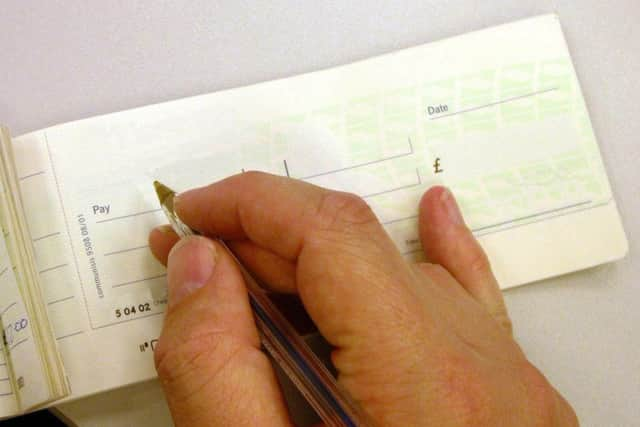Jim Duffy: Consigning the cheque book to museum relic
This article contains affiliate links. We may earn a small commission on items purchased through this article, but that does not affect our editorial judgement.


I used to love writing cheques to people and popping them in the post in an envelope. Then, a few colleagues of mine suggested I was a bit behind the times and that I should embrace digital banking more effectively.
I gave in and have never looked back. Paying bills and setting up direct debits is now a doddle.
Advertisement
Hide AdAdvertisement
Hide AdThen it got even more interesting with the advent of mobile banking. Interestingly, mobile banking used to mean a banking van heading to hard-to-reach places so people could cash their cheques. Now it means the smartphone or tablet in your hand.


Financial technology, or “fintech”, has made huge technological leaps in the last few years. Mobile banking is innovation on steroids. Naturally, I bank with Royal Bank of Scotland as they are the yin to our yang at Entrepreneurial Spark.
I have my banking app on my iPhone and my iPad. At any time of the day, I can look at my balance, pay a bill, transfer cash to my kids (which I seem to do frequently) and set up direct debits and payment schedules. I can do this at home, on a train to one the Entrepreneurial Spark hubs across the UK or in a coffee shop in Edinburgh, while I watch the world go by.
In essence, I have a bank branch in my hand. When I was a small boy and used to have to go into banks for stuff, I couldn’t have dreamed that one day I would be able to have such powerful tech at my fingertips. In fact, when I bought my first iPhone, I had no idea that banking apps would add so much flexibility to my life… in this life. And fintech is just getting started…


Some may point out to recent research which suggests that venture capital invested less in fintech last year than the year before in the UK. Indeed that may be the case, as there has been a paradigm shift in how fintech is viewed by big financial companies.
Traditionally, a fintech entrepreneur would “invent” a piece of technology and land investment from business angels and then venture capitalists. The company value went up and they would then punt the whole thing to, say, a bank or a big accountancy firm. The tech then became useful and was adopted by said purchasers.
However, big banks and financial outfits have got wise to this and have learned a lot from the fintech entrepreneurs they rub shoulders with. Why not bring the fintech entrepreneur into the bank and work with them more closely on solutions that are relevant to their respective strategies? “Customer intimacy” – I’m sure I learned that one at Babson College in the US on the Saltire Leadership course. All makes sense…
Advertisement
Hide AdAdvertisement
Hide AdSo it makes even more sense for a big institution that wants to serve its customers better in the future to make sure it has the best fintech minds in and around it. Hence, why Royal Bank of Scotland this week launched its fintech proposition within the Gogarburn Entrepreneurial Spark hub.
Now, I’m not a fintech entrepreneur… yet. But, if I was, I’d be tearing down the doors to get into this programme or anything similar with any big bank.
Why? Well, if I’m clever, I have my investment strategy and my exit strategy right there in front of me. I get to work with first-class tech teams who want to help me hone and prototype my fintech, while I also get a big client and potential customer base to trial it with.
Banks today are, in effect, tech companies that lend money. And the smarter, more intuitive and secure the tech is, the better it becomes for the customer of the 21st century.
Why do we have to change and adapt? It’s called innovation and the demand for it from the consumer is becoming more intense. Millennials want more from their mobile tech and who are we to argue with them as they share and embrace technology.
Looks like I’m putting my cheque book into storage.
• Agitator and disruptor Jim Duffy is head of #GoDo at Entrepreneurial Spark
